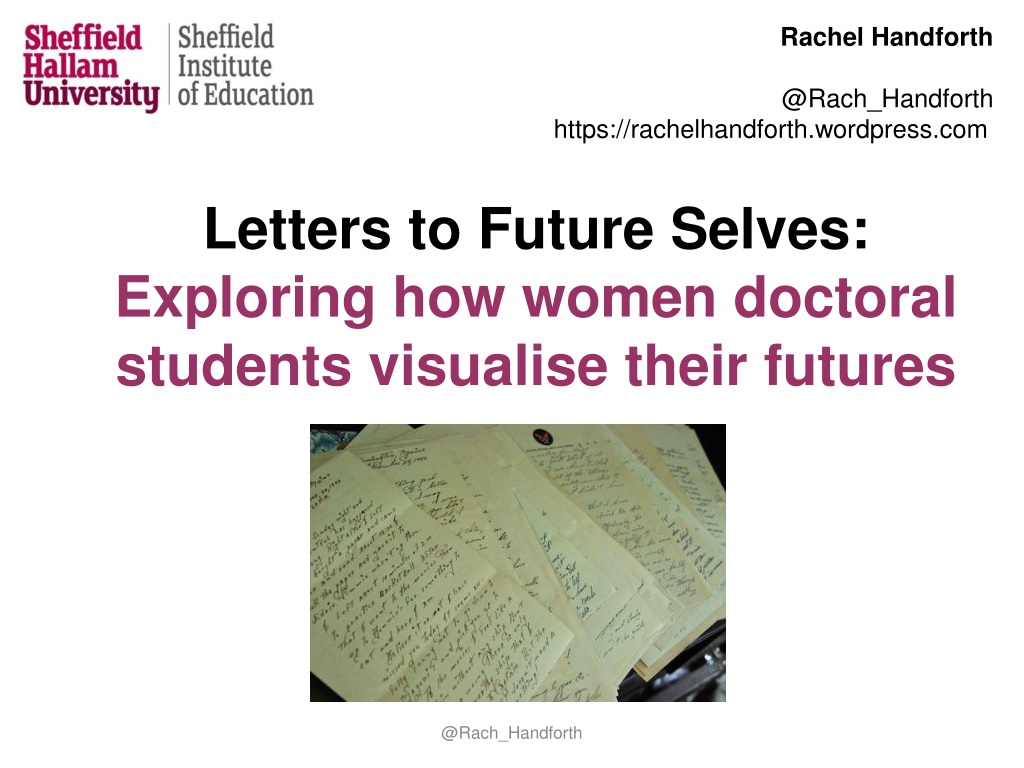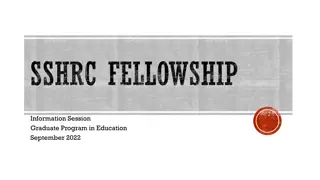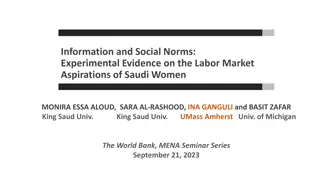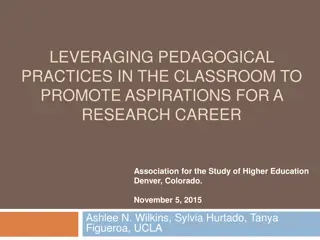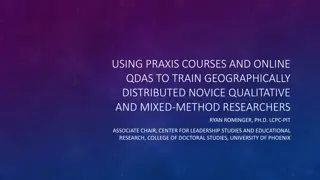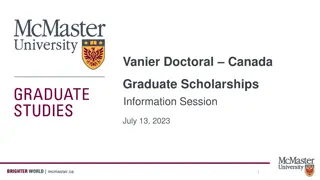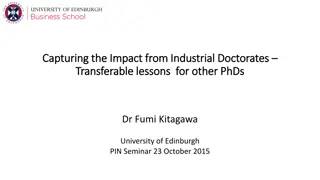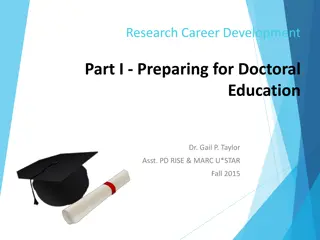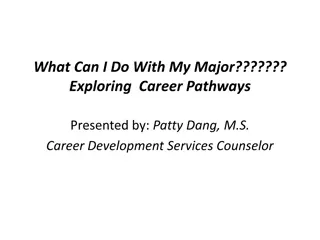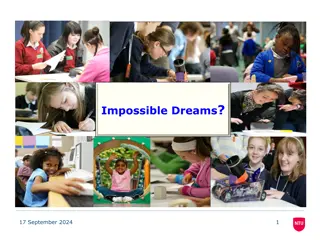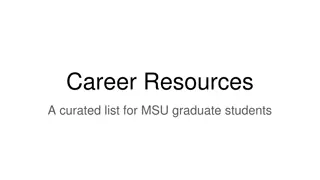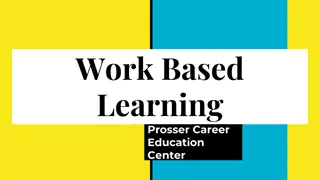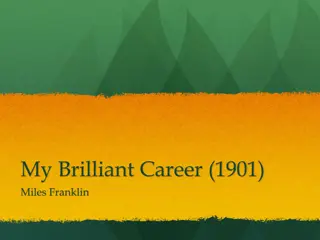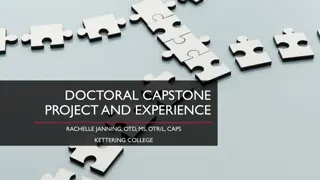Exploring Career Aspirations of Women Doctoral Students
Three-year longitudinal study by Rachel Handforth delves into the career aspirations of women PhD students, analyzing their experiences and why they are less likely to pursue academia post-PhD. Through examining imagined futures and possible selves, the research sheds light on the factors influencing career choices post-doctoral studies.
Download Presentation

Please find below an Image/Link to download the presentation.
The content on the website is provided AS IS for your information and personal use only. It may not be sold, licensed, or shared on other websites without obtaining consent from the author. Download presentation by click this link. If you encounter any issues during the download, it is possible that the publisher has removed the file from their server.
E N D
Presentation Transcript
Rachel Handforth @Rach_Handforth https://rachelhandforth.wordpress.com Letters to Future Selves: Exploring how women doctoral students visualise their futures @Rach_Handforth
My Research Three year longitudinal study Explores the career aspirations of women PhD students Participants are from across discipline areas Examines womens experiences of doctoral study Interested in why women are less likely to pursue a career in academia after doing a PhD than men (see Royal Society of Chemistry, 2008 and Wellcome Trust, 2013) @Rach_Handforth
Imagined Futures What do participants imagine for themselves at the end of the PhD? What do they perceive as possible, and how does this change from their first to their final year of the PhD? Possible selves theory used to explore this (Markus & Nurius, 1986) @Rach_Handforth
Possible Selves Are 'conceptions of the self in future states' (Leondari, Syngollitou & Kiosseoglou, 1998: 154) Can relate to any aspect of life, for example to individuals health, lifestyle or career (Hortmanshof & Zimitat, 2003) May be either positive or negative: 'an individual's repertoire of possible selves can be viewed as the cognitive manifestation of enduring goals, aspirations, motives, fears, and threats (Markus & Nurius, 1986: 954). @Rach_Handforth
Career-Possible Selves Highlights the careers to which participants aspire- but also the careers that they do not consider as possible Chalk, Meara, Davis and Day (2005) argue that the more developed, or elaborated individuals' career-possible selves are, the more they are motivated to achieve this goal Supported by work done by Oyserman & Fryberg (2006) and Stevenson & Clegg (2010) @Rach_Handforth
Letters to Selves Highly personal documents (or videos) Allow insight into individuals' hopes and dreams and their concerns and doubts for the future Letters to future selves not often utilised in academic research, other than in psychology (see van Gelder et al., 2013) @Rach_Handforth
Participants Letters October 2014: Participants and I begin the PhD January 2015: Letters to Future Selves collected Spring 2017: Letters to Past Selves collected Given a brief guidance note which asked them to include details of their hopes for the future and any challenges that they foresaw Participants reacted positively to the invitation to write the letter to their future self- appreciated that they would be able to keep it for posterity @Rach_Handforth
Future-oriented narratives Writing letters to future selves required participants to construct a particular kind of narrative from a specific point in time Yet their stories are constantly under construction (Baker and Lattuca, 2010) Narratives are likely to progress differently to how they are imagined at the start of the PhD @Rach_Handforth
Narrative Constructions Wherever one positions oneself in that continuum- the imagined now, some imagined past, or some imagined future- each point has a past experiential base and leads to an experiential future Clandinin and Connelly (2000: 2) Participants started the doctorate with existing fears, motivations and aspirations- their letters reflect how these factors have shaped their possible selves @Rach_Handforth
Possible Selves in Letters Multiplicity of possible selves identified- often not career-related Example of Harriet, a doctoral student studying Biology at Redbrick University While others constructed a range of career- possible selves, she only imagines one possible career, that of a scientist Not particularly elaborated- and does not seem to motivate her @Rach_Handforth
Hello future me! Harriet, Spring 2015 If you have made it that far, past-you is very proud as you weren t even sure a PhD was the right thing to do at the time. Currently, I am still not sure if a career is a researcher is actually what I want or if I am doing a PhD because it seems like the next natural step. I feel like I have conformed to all of the traditional educational steps so far, but I really hope that you feel like a PhD is something you wanted to do because you enjoyed it and it was worth all of the hard times and stress that I m sure there is to come. I hope you are still as interested in finding the answer to biological questions as I am now, and you haven t lost your spirit and inquisitiveness! I hope you aren t as stressed as everyone said David was before his thesis submission. future now, but I expect that you haven t been pushed in to anything and will be doing something interesting whatever it may be! Don t forget about how much you wanted to take some time off from work to travel the world. I don t know how hard it is to take time out and then come back in at a post-doc level, but I hope any difficulties that are likely to come out of a year out will not put you off doing it. You haven t had a break from education since you started school and you need it! I know you will hugely regret not travelling while you are young as you will probably want to have a family one day which will make it even more difficult. JUST DO IT!!! SEE THE WORLD! Once you have a PhD you have it for life! I don t know what career decisions you may have made by then as I have no clue about the post-grad friends. Try not to let any partner you may have influence your decision to travel or go straight into a job, it s not worth giving up an experience you always thought you d have for someone else. Still, keep an open mind about what options you have and have faith in funding bodies and fellowships that someone will fund you if you want to keep doing research. Make sure you thank your family and friends for being so supportive, even though you probably feel quite isolated at the moment, you didn t do this by yourself. I m sure everyone in the lab will want to help so make sure you ask them if you need anything! I also hope your personal life is okay, and you still keep in contact with your undergrad and
Harriet Whilst she is still not sure if a career as a researcher is actually what I want and has no clue about the future now , she is certain of her desire to travel; you will hugely regret not travelling while you are young This traveller possible self motivates Harriet to take a break from education; 'JUST DO IT!!! SEE THE WORLD! Once you have a PhD you have it for life!' Fears that she may end up compromising her traveller possible self in favour of her scientist career-possible self: I don t know how hard it is to take time out and then come back in at post-doc level, but I hope any difficulties that are likely to come out of a year out will not put you off doing it' @Rach_Handforth
Letters to Past Selves Combination of letters to past selves with letters to future selves within a longitudinal framework allows the difference between participants imagined narratives and their actual narratives of experience to be highlighted Highlights the reality of the doctoral experience, and how this shapes participants possible selves This work is ongoing- currently collecting letters to past selves @Rach_Handforth
Contribution to Knowledge Unusual method generates data about participants' imagined futures not captured through other methods Significant methodological contribution to literature on doctoral students aspirations Theoretical contribution using possible selves theory in a new context @Rach_Handforth
Conclusion PhD students begin the doctorate on an already- imagined narrative trajectory- letters to future selves show how participants past experiences shape their possible selves Using letters generates insight into how far participants career-possible selves are motivating forces This method enables a unique insight into how women doctoral students imagine their future @Rach_Handforth
References BAKER, Vicki L. and LATTUCA, Lisa R. (2010). Developmental networks and learning: Toward an interdisciplinary perspective on identity development during doctoral study. Studies in higher education, 35 (7), 807-827. HORSTMANSHOF, Louise and ZIMITAT, Craig (2003). Elaboration of the student self and persistence in higher education. Paper presented at the New Zealand Association for Research in Education (NZARE)/Australian Association for Research in Education Conference, Auckland, New Zealand, 29 November 3 December MARKUS, Hazel and NURIUS, Paula (1986). Possible selves. American psychologist, 41 (9), 954. PIZZOLATO, Jane Elizabeth (2007). Impossible selves investigating students persistence decisions when their career-possible selves border on impossible. Journal of career development, 33 (3), 201- 223. Royal Society of Chemistry (Newsome, Jessica Lober) (2008). The chemistry PhD: The impact on women s retention. A report for the UK resource centre for women in SET and the royal society of chemistry, , 1-38. VAN GELDER, J. L., HERSHFIELD, H. E. and NORDGREN, L. F. (2013). Vividness of the future self predicts delinquency. Psychological science, 24 (6), 974-980. WELLCOME TRUST (2013) Risks and rewards: How PhD students choose their careers. Ipsos MORI, London, .
Questions? Rachel Handforth : @Rach_Handforth https://rachelhandforth.wordpress.com @Rach_Handforth
Hello past me! Harriet, Spring 2017 think it has turned out as you expected but that is not a bad thing. You are still not sure what you want to do after this PhD, which is definitely scarier now than it was then, but you have discovered more interesting options that could be great for you. Take all the opportunities to try something new and listen to people talk about the different things they did after their PhDs. You were so intrigued by what was to come over the next three or four years. I don t The last 2 and a half years have definitely had their ups and downs but you ve come to a happy medium at this point where you are content to continue and get to the end no matter how your experiments turn out. You have ended up with far less input into your PhD than you thought, largely down to how your supervisor runs the lab ( you must do as I say sort of attitude). That will feel disappointing sometimes as you came into the lab to learn how to think scientifically and plan experiments. Therefore, as hard as it may seem, try and find time to THINK about what you re doing and what you want to find out. Don t be afraid, like I was, to take time out of being in the noisy office and go to the library to have a thinking/planning session. If you think you have a good idea for an experiment, JUST DO IT! It is a lot more satisfying doing a project or experiment that you have thought of yourself. Don t always listen to your supervisor or Niko, they aren t doing their PhDs so look at things with a different perspective. Try and stay calm about the whole thing, there will sometimes be a stressful atmosphere around you but I know you can take it in your stride and keep going. It doesn t matter how everyone else is doing, there is no need to compare yourself to them. Sometimes your colleagues will talk about publishing papers and getting good results but you just need to work hard and stay relaxed. Don t give in to the comments Stuart makes about holidays, working 24/7 etc, he is using you to get more papers and therefore more money for himself.
Hello past me! Harriet, Spring 2017 adventures, you are going to have an amazing time in Bali! Still live your life. A PhD isn t your life. Keep enjoying being in the lab! Remember that that s why you wanted to do a PhD. Even though it will sometimes feel like you don t have the freedom that you thought comes with a PhD, you still have more than in a regular job! Make sure that you are your top priority! Keep up your hobbies, your friends and go on Keep reminding yourself that a PhD is a training program, no matter what Stuart says or how he treats your results. I have realised now that you don t need lots of positive, game-changing results to get a PhD. Most people don t find anything exciting at all so don t worry about finding paper- worthy results. Anyway, by the time you finish your second year you would have published a review in Biochemical Journal. By your third year you will be coordinating an Outreach programme for the University. You will gain lots of skills and have lots of experiences, in and outside of the lab. Think about them all equally, the experiments aren t always the most important thing. Look after Matt and he will look after you! You are going to find a lovely flat that you can make your own. Stay in touch with your family, they deserve the best from you. Don t panic or worry during your PhD, it will all work itself out if you stay patient, calm and happy! Future Harriet.
